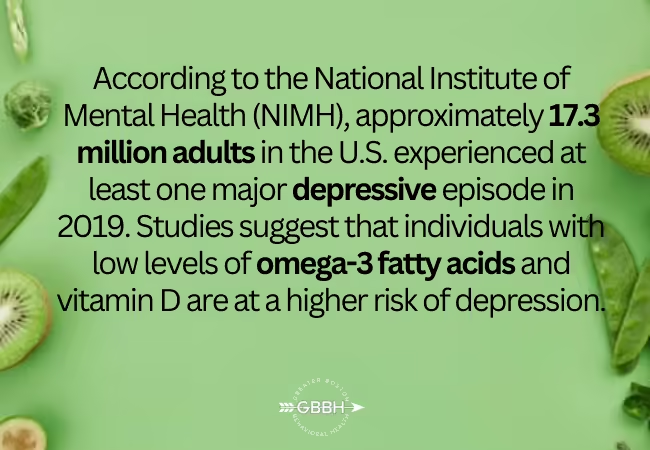At Greater Boston Behavioral Health, we believe in a holistic approach to mental health that integrates various treatments, including therapy, medication, and lifestyle changes. One of the most recent and transformative areas of focus in mental health care is nutritional psychiatry. This field examines the relationship between the foods we consume and our mental well-being, offering new insights into how dietary choices can affect mood, behavior, cognition, and mental health disorders like depression, anxiety, and bipolar disorder.
Recent research has highlighted the critical connection between nutrition and brain function, revealing that what we eat can directly influence our mental state. A growing body of evidence shows that certain nutrients and dietary patterns can enhance brain health, improve mood regulation, and even alleviate symptoms of mental health disorders. In this article, we’ll explore the foundational principles of nutritional psychiatry and discuss how Greater Boston Behavioral Health incorporates nutritional strategies into comprehensive Mental Health Treatment Programs.
What is Nutritional Psychiatry?
Nutritional psychiatry is a multidisciplinary approach that explores the connection between diet and mental health. It is based on the understanding that nutrition significantly impacts brain function, cognitive performance, and emotional regulation. Just as our bodies require the right nutrients to function optimally, so too does our brain. A balanced, nutrient-rich diet supports the brain’s ability to produce essential neurotransmitters that regulate mood, thought processes, and behavior.
Nutritional psychiatry is not just about addressing deficiencies in certain vitamins or minerals. It’s about understanding the complex role of food in brain health and how a holistic approach to diet can lead to more effective management of conditions like depression, anxiety, ADHD, and bipolar disorder.
The Gut-Brain Axis: How Food Impacts the Brain
A fascinating discovery in nutritional psychiatry is the gut-brain axis, a two-way communication system between the digestive system and the brain. The gut is often referred to as the “second brain” because it contains trillions of bacteria that play a crucial role in digestion, nutrient absorption, immune function, and even mental health. These bacteria not only aid in the breakdown of food but also produce neurotransmitters like serotonin—a key player in mood regulation.
What we eat can either support or disrupt the balance of gut bacteria. Diets rich in fiber, prebiotics, and probiotics can help promote a healthy gut microbiome, which in turn supports brain function and emotional well-being. In contrast, a diet high in processed foods and sugar can cause inflammation and imbalance in the gut, contributing to mood disorders and cognitive decline.
The Role of Key Nutrients in Mental Health
Research has revealed that several key nutrients are directly linked to mental health outcomes. Below, we highlight some of the most important nutrients that support brain function and emotional stability.
1. Omega-3 Fatty Acids:
Found primarily in fatty fish like salmon, mackerel, and sardines, as well as flaxseeds, chia seeds, and walnuts, omega-3 fatty acids are essential for healthy brain function. These fats support the integrity of brain cells and facilitate communication between neurons. Omega-3s have been shown to reduce inflammation, which is often elevated in individuals with depression and anxiety, and they may also boost the effectiveness of antidepressant medications. Incorporating omega-3-rich foods into your diet can promote emotional stability and cognitive function.
2. B Vitamins:
B vitamins, especially B6, B12, and folate, play a critical role in producing neurotransmitters like serotonin, dopamine, and norepinephrine, which regulate mood and energy levels. Deficiencies in these vitamins have been linked to depression, fatigue, and irritability. B vitamins are found in foods like leafy greens, whole grains, eggs, and meats. Ensuring adequate intake of B vitamins can improve mood, reduce irritability, and enhance overall cognitive function.
3. Magnesium:
Magnesium is a mineral that supports over 300 biochemical reactions in the body, including those that regulate mood, stress response, and sleep. Low levels of magnesium have been associated with anxiety, depression, and insomnia. Dark chocolate, leafy greens, nuts, and seeds are rich sources of magnesium. Magnesium supplementation can help reduce anxiety, improve sleep quality, and promote relaxation.
4. Amino Acids:
Amino acids are the building blocks of proteins and neurotransmitters. Neurotransmitters like serotonin and dopamine are made from specific amino acids, which are critical for mood regulation and cognitive function. Foods like turkey, chicken, tofu, and beans are excellent sources of amino acids. A diet that ensures an adequate supply of amino acids can help balance neurotransmitter levels and enhance emotional regulation.
5. Antioxidants:
Antioxidants are compounds found in foods like berries, green tea, and leafy greens that help combat oxidative stress and inflammation. Oxidative stress has been linked to various mental health conditions, including depression and anxiety. By reducing oxidative stress, antioxidants can help protect the brain from damage, improve cognitive function, and reduce the symptoms of mental health disorders.
How Diet Affects Mood and Behavior
What we eat significantly impacts our mood, behavior, and overall mental health. Foods rich in nutrients such as vitamins, minerals, and healthy fats help maintain brain function and promote emotional well-being, while poor dietary choices can lead to mood swings, irritability, and increased vulnerability to mental health disorders like anxiety and depression.
The brain relies on specific nutrients to regulate neurotransmitters like serotonin, dopamine, and GABA, which control emotions, behavior, and cognitive function. For example, omega-3 fatty acids found in fatty fish, nuts, and seeds help support neurotransmitter function, and B vitamins found in leafy greens and legumes are essential for mood regulation. On the other hand, diets high in processed sugars, refined carbohydrates, and unhealthy fats may increase inflammation in the brain, contributing to feelings of depression and anxiety.
Making mindful food choices not only helps improve overall mental health but also boosts cognitive function, increases energy levels, and promotes better sleep—all of which are vital for maintaining emotional balance.
Common Dietary Deficiencies in Mental Health Conditions
Certain nutritional deficiencies are more commonly found in individuals experiencing mental health conditions, and these deficiencies can exacerbate or even contribute to the symptoms. Some of the most common deficiencies linked to mental health disorders include:
- Omega-3 Fatty Acids: Low levels of omega-3s, commonly found in fatty fish, flaxseeds, and walnuts, have been linked to depression, anxiety, and even bipolar disorder. Omega-3s help regulate neurotransmitters and reduce inflammation in the brain.
- Vitamin D: Deficiency in vitamin D is common in individuals with depression, especially in areas with limited sunlight. Vitamin D plays a key role in brain function and the regulation of mood.
- B Vitamins (B6, B12, Folate): These vitamins are crucial for neurotransmitter production. A deficiency, especially in folate and B12, can lead to symptoms of depression, fatigue, and cognitive decline.
- Magnesium: Low magnesium levels are associated with anxiety, irritability, and poor sleep. Magnesium helps regulate the nervous system and can help reduce stress.
- Iron: Iron deficiencies may cause fatigue, weakness, and difficulty concentrating, all of which can negatively affect mood and cognitive function.
Building a Brain-Healthy Diet
Creating a brain-healthy diet is an essential step toward supporting mental health. A well-rounded diet that includes a variety of whole foods provides the nutrients your brain needs to function optimally. Here are some tips for building a brain-healthy diet:
- Incorporate Whole Grains: Whole grains like oats, quinoa, and brown rice provide a steady supply of energy for the brain and help regulate blood sugar, which can have a stabilizing effect on mood.
- Include Healthy Fats: Omega-3-rich foods such as salmon, flaxseeds, and walnuts, along with healthy fats from avocado and olive oil, help maintain brain health and reduce inflammation.
- Eat a Rainbow of Vegetables and Fruits: Colorful fruits and vegetables are rich in antioxidants, which protect the brain from oxidative stress and inflammation. Aim to include leafy greens (rich in folate) and berries (high in antioxidants) in your daily meals.
- Consume Protein-Rich Foods: Protein is vital for neurotransmitter production, so include sources like lean meats, eggs, legumes, and tofu in your diet.
- Limit Processed Foods and Sugar: Highly processed foods and sugary snacks can cause spikes in blood sugar, leading to mood swings and irritability. Instead, opt for whole foods with a balance of complex carbohydrates, fiber, and healthy fats.
- Stay Consistent with Meals: Skipping meals or over-restricting your diet can lead to low blood sugar levels, which can negatively impact mood and energy. Eating regular, balanced meals helps regulate emotions and cognitive function.
Nutritional Psychiatry and Mental Health Treatment at Greater Boston Behavioral Health
At Greater Boston Behavioral Health, we recognize that mental health treatment must address the whole person—body, mind, and spirit. While Cognitive Behavioral Therapy (CBT), Dialectical Behavioral Therapy (DBT), and other therapeutic modalities are essential for managing mental health conditions, nutrition also plays a pivotal role in supporting mental wellness.
Our Intensive Outpatient Program (IOP) and Outpatient Mental Health Treatment services integrate nutritional psychiatry principles into treatment. This holistic approach helps our patients achieve lasting mental health improvements by combining therapy, medication, and dietary changes.
In addition to traditional treatments, we provide guidance on mindful eating and encourage patients to incorporate brain-healthy foods into their diets. For those in need of specialized care, we may refer patients to nutritionists or dietitians who specialize in mental health. These professionals can help develop personalized meal plans that support mental health recovery, reduce symptoms of anxiety and depression, and improve overall well-being.
The Benefits of Nutritional Psychiatry in Mental Health Recovery
Incorporating nutrition into mental health treatment can:
- Enhance therapy outcomes: A nutrient-rich diet can enhance the effectiveness of therapeutic treatments like CBT and DBT, helping individuals achieve long-lasting improvements in mood, cognitive function, and emotional regulation.
- Improve medication effectiveness: Proper nutrition can help optimize the effectiveness of antidepressant or anxiolytic medications, leading to better outcomes and fewer side effects.
- Support long-term mental health: A healthy, balanced diet promotes brain health and emotional stability, helping to prevent future mental health crises and reduce the risk of relapse in those with chronic conditions.
Conclusion
Nutritional psychiatry offers exciting new possibilities for supporting mental health recovery. At Greater Boston Behavioral Health, we integrate nutritional strategies into our mental health treatment programs to enhance the effectiveness of therapy, medication, and other treatments. Whether you are struggling with depression, anxiety, bipolar disorder, or another mental health condition, adopting a nutrient-dense diet can support brain health, improve mood, and foster emotional resilience. Call us at (888)278-0716 today to learn more about our services and how we can help you on your journey to recovery!
FAQ on Nutritional Psychiatry
What is nutritional psychiatry, and how does it relate to mental health?
Nutritional psychiatry is an emerging field that focuses on the connection between diet and mental health. It examines how certain nutrients can impact brain function, mood, and behavior. A balanced, brain-healthy diet can support mental health by regulating neurotransmitters, reducing inflammation, and improving overall brain health.
Can food really affect my mood and behavior?
Yes, the foods you consume can significantly impact your mood and behavior. Nutrient-rich foods support optimal brain function, while a diet high in processed foods and sugars can contribute to mood swings, irritability, and increased anxiety or depression.
What are the most common nutritional deficiencies linked to mental health disorders?
Common deficiencies that can impact mental health include omega-3 fatty acids, vitamin D, B vitamins (especially folate and B12), magnesium, and iron. Correcting these deficiencies through diet or supplements can help improve mental health symptoms.
How can I build a brain-healthy diet?
To build a brain-healthy diet, focus on incorporating whole grains, lean proteins, omega-3-rich foods, colorful fruits and vegetables, and healthy fats. Avoid processed foods and limit sugar intake to support mental clarity and emotional stability.


